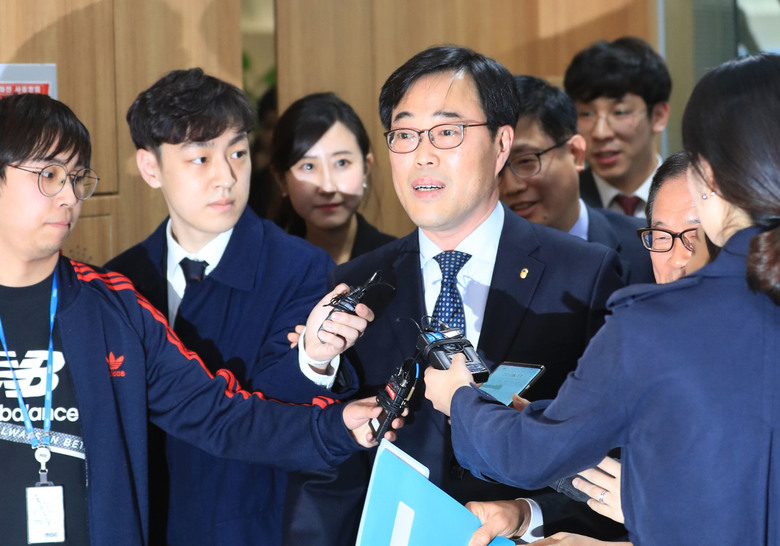 |
|
Kim Ki-sik, head of the Financial Supervisory Services, speaks to reporters as he makes his way to a CEO Meeting of the Korea Federation of Savings Banks in the Mapo district of Seoul on Apr. 16. (Yonhap News)
|
Kim Ki-sik submitted his resignation from the agency just 17 days after his appointment
On Apr. 16, South Korea’s National Election Commission (NEC) found that a donation of 50 million won (US$470,000) of political funds that Kim Ki-sik, head of the Financial Supervisory Service, made to a group of Democratic Party lawmakers (including himself) called the Korea Institute for the Future shortly before the end of his term as a lawmaker in the National Assembly was a violation of the Public Official Election Act. Immediately after the NEC made its decision, Kim submitted his resignation, just 17 days after he was appointed on Mar. 30. The NEC notified the Blue House of this decision, which it reached after more than four hours of deliberation during a plenary session of its nine members (including NEC Chairman Kwon Sun-il) at its Gwacheon office on the afternoon of Apr. 16. In regard to Kim’s donation of 50 million won in political funds to the Korea Institute for the Future, a research institute composed of current and former lawmakers in the Democratic Party, on May 19, 2016, shortly before his term as a lawmaker was set to end on May 29, the NEC found that “donating an amount that is much larger than before is a violation of Article 113 of the Public Official Election Act.” Kim had been paying monthly dues of 200,000 won (US$187) to the Korea Institute for the Future, and the NEC found that his one-time donation of 50 million won (which exceeded his dues by a factor of 250) at the end of his term deviated from “paying dues at the previous level according to the organization’s charter and bylaws and customary duties.” In addition, the NEC found that using political funds at the end of a lawmaker’s term to pay severance fees to staff members was not against the law. “Making a customary payment to express gratitude for staff’s political activity and to compensate them as they leave their job counts as a political activity expense,” the NEC said. The fact that Kim went on a business trip that was funded by an organization audited by his committee “might correspond to taking political funds according to the Political Funds Act,” the NEC said, but deferred its decision. “The question of whether the law was broken depends on whether there was a legitimate reason for this according to societal norms, taking into account the business trip’s objective and itinerary and its correlation with work.” The opposition party has filed a legal complaint against Kim for going on a business trip funded by an organization audited by his committee. In regard to the fact that Kim was accompanied by aides and did some sightseeing while on overseas business trips, the NEC said, “Using political funds to bring along interns or aides to achieve the objective of the trip or to pay for some incidental sightseeing for the purpose of relaxation does not by itself constitute a violation of the Political Funds Act, so long as those funds were not used for private expenditures or for inappropriate purposes.” On Apr. 13, Moon promised to have Kim step down if it could be objectively shown that Kim had broken the law in regard to even one of the four allegations mentioned above. “We respect the NEC’s decision,” Senior Secretary to the President for Public Relations Yoon Young-chan told reporters after the NEC’s announcement. “President Moon intends to accept the resignation tendered by Kim Ki-sik.” By Song Kyung-hwa and Seong Yeon-cheol, staff reporters Please direct questions or comments to [english@hani.co.kr]





